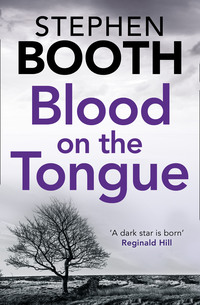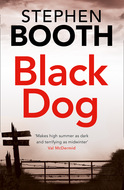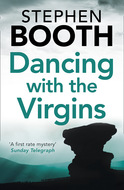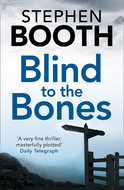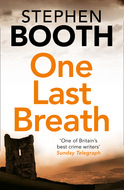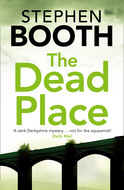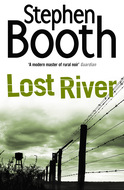Książki nie można pobrać jako pliku, ale można ją czytać w naszej aplikacji lub online na stronie.
Czytaj książkę: «Blood on the Tongue»

STEPHEN BOOTH
Blood on the Tongue

Dedication
For Eric Jefferson
Epigraph
Lines from ‘Won’t you let me take you on a sea cruise?’, a rock’n’roll classic recorded by Frankie Ford, reproduced by permission of Sea Cruise Productions, Inc.
Contents
Cover
Title Page
Dedication
Epigraph
1
2
3
4
5
6
7
8
9
10
11
12
13
14
15
16
17
18
19
20
21
22
23
24
25
26
27
28
29
30
31
32
33
34
35
36
Acknowledgments
About the Author
By the same author
Copyright
About the Publisher
1
It was an hour before dawn when Detective Constable Ben Cooper first began to get the news. An hour before dawn should be the dead hour. But in the bedrooms of third-floor flats on the council estates, or in stone-built semis in the hillside crescents, there were people blinking in bewilderment at an alien world of deadened sounds and inverted patterns of dark and light. Cooper knew all about the hour before dawn, and it was no time of day to be on the streets. But this was January, and dawn came late in Edendale. And snow had turned the morning into shuddering chaos.
Cooper pulled up the collar of his waxed coat to meet the rim of his cap and brushed away the flecks of snow that had caught in the stubble on his jawline where he had rushed shaving that morning. He had walked down one of the alleyways from the market square, crunching through fresh snow, slithering on the frozen cobbles, passing from light to dark as he moved out of the range of the street lamps. But he had stepped out of the alley into a noisy snarl of traffic that had choked the heart of Edendale and brought its snow-covered streets to a halt.
On Hollowgate, lines of frustrated motorists sat in their cars, boot to bonnet in clouds of exhaust fumes. Many of them had been driving almost blind, their windscreens covered in half-scraped snow or streaks of brown grit that their frozen wipers couldn’t clear. The throbbing of engines filled the street, echoing from shop facades and the upper storeys of nineteenth-century buildings. Headlights pinned drivers and their passengers in cruel shadows, like silhouettes on a shooting range.
‘We have a serious double assault, believed to be racially motivated. Approximately zero two hundred hours. Underbank area.’
The voice from his radio sounded alien and remote. It was the crackly voice of a tired operator in a control room with no windows, where they would never know if it was still snowing or the sun had risen. Not unless somebody called in and gave them a weather report. We have sporadic outbreaks of violence. Occasional blood on the streets. It’s an hour to go before dawn.
Cooper stepped off the edge of the pavement and straight into six inches of wet slush. It went over the top of his shoe and turned his foot into a frozen sponge. Since it was only seven o’clock and still completely dark, it was going to be a long, uncomfortable shift unless he got to his locker at E Division headquarters in West Street pretty soon for a change of socks.
‘Two male victims received multiple injuries and are described as being in a serious condition.’
Cooper worked his way between the gridlocked cars to reach the far side of Hollowgate. Around him, fumes rose from the shadows and hung under the lamps, trapped in the street by the freezing temperature and the stillness of the air. They created a grey blanket that absorbed the light and swirled slowly in front of black Georgian windows sparkling with frost.
‘Four suspects are currently being sought. All are white males, aged between twenty-five and forty-five. Local accents. One suspect has been identified as Edward Kemp, 6 Beeley Street, Edendale. Thirty-five years of age. Hair short and dark brown, approximately six feet tall.’
The weather changed so quickly in the Peak District that snowfall always seemed to take motorists in the town by surprise. Yet within a few miles of Edendale all the minor roads and passes would still be closed and outlying villages would be cut off until the snowploughs reached them. They might be isolated until tomorrow, or the next day.
Cooper had set off early because of the weather. On his way in from Bridge End Farm, as he steered his Toyota into the tracks left by the first snowplough, the hills around him had been glittering and pristine, like huge wedding cakes covered in sugar icing, lurking in the darkness. But it meant he had missed his breakfast. Now what he needed was a couple of cheese toasties and a black coffee. He was tempted by the lights of the Starlight Café, reflecting off the banks of untouched snow.
‘Edward Kemp is described as powerfully built, with a distinctive body odour. Last seen wearing a dark overcoat and a hat. No further description available at this time.’
Cooper peered into the café. Behind the condensation on the plate-glass window there were figures wrapped in coats and anoraks, scarves and gloves, and a variety of hats made of fur, leather and wool. They looked like models posing for an Arctic explorers’ clothing catalogue.
‘All suspects could be in possession of baseball bats or similar weapons. Approach with caution.’
Now he could almost taste the coffee; he could feel the crunch of the toasted teacake and the clinging softness of the melted cheese. Saliva began to seep on to his tongue. Cooper pulled back his glove to look at his watch. Plenty of time.
While his nose was pressed close to the window, a hand came up and wiped away some of the condensation. A woman’s face appeared, her eyes wide with outrage. She mouthed an obscenity and raised two fingers that poked from a blue woollen mitten. Cooper pulled away. There would be no toasties this morning, and no coffee.
‘Control, I need a car outside the Starlight Café in Hollowgate.’
‘With you in two minutes, DC Cooper … Is it still dark out there?’
‘It’s an hour before dawn,’ said Cooper. ‘What do you think?’
It was the ice and the scouring wind that created the worst of Marie Tennent’s delusions. They were like daggers thrust into her brain, plunged in so deeply that their edges scraped together in the middle of her skull, filling her head with noise.
For the last hour before she died, Marie believed she could hear music wailing in the wind, the hissing of wheels on an icy road, and the muttering of voices deep in the snow. Her mind struggled to interpret the sounds, to make sense of what was happening to her. But the music was meaningless and the voices distorted, like the babbling of a badly tuned radio when its batteries were almost dead.
Marie lay amid the smells of bruised snow and damp air, with the taste of her own blood in her mouth and her body a bewildering pattern of cold spots and numbness and pain. Her arms and legs were burning where the snow had melted into her clothes and frozen again. And the ache in her head had flowered into a savage, unbearable agony.
It was because of the pain that Marie knew, in a lucid spell, that the sounds she could hear were caused by the tiny bones of her inner ear shrinking and twisting as they froze. They were grating against each other as they contracted, creating an internal whisper and mumble, a parody of sound that mocked her slow withdrawal from the boundaries of reality. It was a disturbing and inarticulate farewell, a last baffling message from the world. It was the only accompaniment to her dying.
The sun had dropped over the edge of Irontongue Hill, so that the snow-covered moor was in shadow, and the temperature was dropping fast. Marie felt the faint, cold kiss of snowflakes on her face. Yet the top of the hill was still touched by the last of the sun, and the snow on the rocks was turned blue by the light. Irontongue itself was hidden from her, its fissured shaft of dark gritstone poking southwards over the valley. But she caught a glint of water to the north, where Blackbrook Reservoir lay in a hollow of the moors.
The last thing Marie saw before her eyelids closed was a thin, dark shape that sliced the skyline on the hill. It seemed to cut into the grey belly of cloud like the blade of a razor. Her mind clutched at the thought of it as she drew together the dregs of her willpower to fight the pain. In the end, that crumbling memorial in the middle of the snowfield had not been the place she was destined to die. It was for men who had lived and died together. It was quite a different thing to die alone.
A series of out-of-focus slides seemed to flicker across a screen in her mind. They were gone too quickly for her to puzzle out their significance, though she knew they were connected to her life. Each one had vague figures that swung and jerked against a dark background. Each brought with it a momentary burst of smells and tastes and sounds, a kaleidoscope of sensations that dragged all the emotions out of her and ripped them away before she could recognize what they were.
There was a voice, too – the voice of a real, remembered person, not a phantom of the snow. ‘We’ll be together,’ it said. ‘Are you happy?’ it said.
And then there were just three final words. They came amid an eruption of intolerable pain, the smell of dirty sheets and the sound of scuttling feet above her head. The same voice, but not the same.
‘It’s too late,’ it said.
And Marie Tennent would never see the dawn.
Ben Cooper entered the café. It was full of customers, who sat half-asleep over their mugs of tea, their brains kept barely alert by the tendrils of steam they breathed in through their noses. As Cooper stamped his feet to shake off the snow, a few faces turned away from him, as usual.
One man sat alone near the counter. He was wearing a dark overcoat and a Manchester United hat. Cooper moved up behind him until he was close enough to recognize the smell. The man had an odour about him that identified him against the background of bacon and fried eggs, even among the wet-dog smells from sodden coats and muddy floor tiles.
Cooper moved slightly so that he could see the man’s face.
‘Morning, Eddie,’ he said.
The customer nodded cautiously. It was the best that Cooper could expect, in the circumstances. Eddie Kemp was well known to most of the officers at E Division headquarters. He had visited the custody suite and interview rooms there many times in the past. These days, though, he visited other parts of the West Street station, too, if only from the outside. Eddie Kemp had started a window-cleaning business.
‘Bad weather for business, isn’t it?’ said Cooper.
‘Bloody awful. My chamois leathers are frozen solid. Like dried-up cow pats, they are.’
Kemp didn’t look too good today. His eyes were red and tired, as if he’d been up all night. The Starlight opened at five o’clock for the postal workers starting their shift at the sorting office, for the bus drivers and railway staff, and even a few police officers. Kemp looked as though he had been here since the doors opened that morning.
‘Put your hands on the table, please,’ said Cooper.
Kemp stared at him sourly. ‘I suppose you’re going to spoil my breakfast,’ he said.
‘I’m afraid you’re under arrest.’
The other man sighed and held out his wrists. ‘They only got what they deserved,’ he said.
Yes, it was the sound of feet. Feet creaking around her in the snow. Marie Tennent’s heart lurched painfully against her diaphragm, and a spurt of adrenalin ran through her muscles like acid. She was sure she could hear the footsteps of human rescuers, as well as those of something quicker and lighter that skittered across the surface of the snow. She became convinced that a search dog had sniffed her out, and that arms were about to pull her from the snow and wrap her in a thermal blanket, that friendly hands would bring warmth to her skin with their touch and reassuring voices would ease the agony in her ears.
But the footsteps passed her by. She couldn’t cry out for help, because her reflexes failed and her body had no strength left to react. Her lips and tongue refused to obey the screaming in her head.
Then Marie knew she was wrong. The feet she heard were those of wolves or some other wild predators that lived on the moors. She could sense them creeping towards her and scuttling away, dragging their hairy bellies through the wet snow, eager to claim a share of her body. She pictured them drooling in desperation to tear off chunks of her cooling flesh with their teeth, yet afraid of her lingering smell of humanity. The faint tingling on her cheeks and in the folds of her eyes told her the predators were close enough for her to feel their breath on her face. If she had opened her eyes, she knew she would have found herself staring into their jaws, into the drip of their saliva and the whiteness of their teeth. But she could no longer open her eyes; the tears had frozen her eyelids shut.
The fear passed, as Marie’s brain lost its grasp on the thought and it went slipping away. The pictures were still in her mind, but the cold had drained all the colours from them. The dyes had melted and run, leaving washed-out greys and dark corners, bleeding the meaning from her memories. She could no longer capture the sounds and scents and tastes, no longer even keep hold of that one overwhelming emotion which had swollen so large that it filled her mind, but which now wriggled away from her grasp. Was it grief, anger, fear, shame? Or was it just the same unnameable longing that had haunted her all her life?
Marie had forgotten how she came to be lying in the snow, with the pain in her head and the blood in her mouth. But she knew there was a reason she ought to get up and go home. And she knew it had something to do with Sugar Uncle Victor. But the fingers of ice were squeezing out her consciousness, so that she would soon know nothing at all.
Marie was unaware of her bladder failing and releasing a warm stream that thawed a ragged patch in the snow. Soon, the physical sensations stopped altogether. As Marie’s skin froze and her blood thickened to an ooze, even the illusory sounds retreated beyond the reach of her senses. The footsteps faded and the voices fell silent, because there was no one left to hear them. Her heart slowed until its valves were left fluttering uselessly, pumping no blood through her body.
Finally, Marie Tennent existed only as a speck like a grain of sand floating in an oily residue of memories. Then they, too, swirled away into a hole in the back of her brain, and were gone.
For the fifth time, Ben Cooper turned to peer towards the corner of Hollowgate and High Street. The traffic lights had changed to green, but a queue of traffic was stuck in the middle of the junction.
‘Where’s the car?’ said Cooper, feeling for the radio in his pocket, wondering whether it was worth worsening the mood of the control-room operators at West Street with a complaint about somebody else’s slow response. ‘It should have been here by now.’
Eddie Kemp was wearing black wellies, with woollen socks rolled over the top of them, and his overcoat was long enough to have come back into fashion two or three times since he first bought it from the army surplus store, probably around 1975. Cooper thought he looked warm and comfortable. And no doubt his feet were dry.
‘We could flag down a taxi, I suppose,’ said Kemp. ‘Or we could catch a bus. Have you got the right fare on you?’
‘Shut up,’ said Cooper.
Down the road, traffic was still moving on High Street. Cars crawled through white flurries that drifted across their headlights. An old lady in fur-lined boots picked her way over the snow in the gutter. For a moment, Cooper thought of his own mother. He had promised himself he would talk to her tonight, and make sure that she understood he was serious about moving out of Bridge End Farm. He would call in to see her when he finally went off duty.
‘I’m not walking all the way up that hill,’ said Kemp. ‘It’s not safe in these conditions. I might slip and injure myself. Then I could sue you. I could take the police for thousands of pounds.’
Cooper wished he could distance himself from Kemp’s powerful smell, but he daren’t loosen his grip or shift from his eight-o’clock escort position at his prisoner’s left elbow.
‘Shut up,’ he said. ‘We’re waiting for the car.’
He was aware of customers coming out of the café now and then, the doorbell clanging behind them. No doubt each one stopped for a moment in the doorway, staring at the two men on the kerb. Cooper shifted his weight to maintain his grip. He felt the slush in his left shoe squelch as he put his foot down.
‘Maybe the car’s broken down,’ said Kemp. ‘Maybe it wouldn’t start. These cold mornings play hell with cheap batteries, you know.’
‘They’ll be here soon.’
On the far side of Hollowgate, shopkeepers were clearing the snow from the pavement in front of their shops, shovelling it into ugly heaps in the gutter. The beauty of snow vanished as soon as it was touched by the first footstep or the first spray of grit from a highways wagon. By daylight, it would be tarnished beyond recognition.
‘I have to tell you I’ve got a delicate respiratory system,’ said Kemp. ‘Very susceptible to the cold and damp, it is. I might need medical attention if I’m kept outside in these conditions too long.’
‘If you don’t keep quiet, I’m going to get annoyed.’
‘Bloody hell, what are you going to do? Shove a snowball down my neck?’
A pair of flashing blue lights lit up the front of the town hall in the market square, just past the High Street junction. Cooper and Kemp both looked towards the lights. It was an ambulance. The driver was struggling to make his way through the lines of crawling cars.
‘That’s clever,’ said Kemp. ‘Sending for the ambulance first, before you beat me up.’
‘Shut up,’ said Cooper.
‘If you took the cuffs off for a bit, I could use my mobile to phone the missus. She could get the sledge out and hitch up the dogs. They’re only corgis, but it’d be quicker than this performance.’
Behind them, somebody laughed. Cooper looked over his shoulder. Three men were standing in front of the window of the café. leaning on the plate glass, with their hands in the pockets of their anoraks and combat jackets. They wore heavy boots, a couple of them with steel toecaps, like the safety boots worn by builders in case they dropped bricks or scaffolding on their feet. Three pairs of eyes met Cooper’s, with challenging stares. Four white males, aged between twenty-five and forty-five. Could be in possession of baseball bats or similar weapons. Approach with caution.
Finally, Cooper’s radio crackled.
‘Sorry, DC Cooper,’ said the voice of the controller. ‘Your response unit has been delayed by a gridlock situation on Hulley Road. They’ll be with you as soon as possible, but they say it could be five minutes yet.’
One of the men leaning against the window began to form a snowball between his gloved fists, squeezing it into the shape of a hand grenade with short, hard slaps.
‘Damn,’ said Cooper.
Kemp turned his head and smiled. ‘Do you reckon we could go back inside and have another cup of tea?’ he said. ‘Only I think it’s starting to snow again. We could freeze to death out here.’
By morning, Marie Tennent’s body had stiffened into a foetal position and was covered in frost, like a supermarket chicken. Ice crystals had formed in the valves of her heart and in her blood vessels; her fingers and toes and the exposed parts of her face had turned white and brittle from frostbite.
Nothing had disturbed Marie’s body during the night – not even the mountain hare that had pattered across her legs and squatted on her shoulder to scratch at patches of its fur. The hare was still brown and ragged, instead of in its winter camouflage white. It defecated on Marie’s neck and left a scattering of fur, dead skin cells and dying fleas for the pathologist to find. For a long while afterwards, Marie lay waiting, just as she had waited in life.
Later in the morning, a patrolling Peak Park Ranger almost found Marie, but he stopped short of the summit when he saw more snow coming towards him in the blue-grey clouds rolling across Bleaklow Moor. He turned back to the shelter of the briefing centre in the valley, retracing his own footsteps, failing to notice the smaller tracks that ended suddenly a few yards up the hill.
When the fresh snowfall came, it quickly covered Marie’s body, gently smoothing her out and softening her outline. By the end of the afternoon, she was no more than a minor bump in the miles of unending whiteness that lay on the moors above the Eden Valley.
That night, the temperature dropped to minus sixteen on the exposed snowfields. Now there was no hurry for Marie to be found. She would keep.
